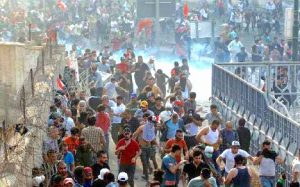Workers Need Communist Revolution
October 7 — In late September, mass protests have erupted in Egypt’s main cities. Thousands are demonstrating against the conditions of poverty. They demand the end of the rule of General Abdel Fatah al-Sisi, who took power in a bloody coup in 2013.
What’s behind this situation? What can we learn from this mass movement?
“Hottest Market” and Mass Poverty
Financial commentators have called Egypt “the world’s hottest emerging market.” In December 2018, foreign holdings of local debt increased more than 20 percent over the previous year, and this trend continues.
But at least 60% of the Egyptian population is “poor or vulnerable” according to the World Bank.
On orders of the International Monetary Fund, more than half of Egypt’s budget pays interest on debts, loans and fees. The regime completely neglects the needs of the masses: health, housing, education and subsidies. The oppressed increasingly feel the consequences of the government’s role in the power struggles among capitalists worldwide
Brutality: Tool of the Capitalist State
Under the Hosni Mubarak dictatorship (overthrown in the Arab Spring of 2011) the State had a brutal system of “security” forces, compliant media, single-party rule and a controlled opposition. Mubarak legitimized his regime by allowing space for dissent in the judiciary or in formal politics. However, the opposition was later attacked in various ways, from mild threats to commercial pressures and even forced “disappearances.”
Since the 2013 coup, the strategy of repression has changed. The government is now less tolerant of any dissent. It even punishes acts of “false democracy” that Mubarak allowed.
In the last six years, sixty thousand people have been arrested. Hundreds have been kidnapped (“disappeared”). Thousands of civilians have been tried in military courts. Al-Sisi’s message is clear: What happened in 2011 will not happen again.
The liberal press points out that this is how a corrupt and degenerate government acts. In contrast, communists see this as the reconstitution of the capitalist State by a part of the Egyptian ruling class allied to the military. They are acting in complicity with the countries aligned to the US imperialist bloc in response to the 2011 rebellion.
Let’s Learn from Mass Rebellions.
Mass protests continue. Cairo was paralyzed. The government is trying to try to contain the movement of the masses. All access roads to Tahrir Square, where the Arab Spring demonstrations took place, were blocked.
Still, thousands gathered in Warraq, Giza, to protest against poverty and repression. They are fighting attempts to evict the residents of the most impoverished sectors of the area for the benefit of tourism. Massive marches also took place in Qena. In Cairo and Alexandria, police dispersed the demonstrations before they started.
It’s not just Egypt
Protests against the economic crisis are shaking the region: Jordan, Lebanon and Iraq. These movements reject the legitimacy of traditional parties. At the same time, they expose the limits of the Arab Spring.
The audacity, courage and innovation of the Arab Spring inspired masses around the world. It demonstrated once again that history is made by the masses in motion. Nevertheless it also demonstrated that without taking power, everything is illusion.
The masses need the leadership of the International Communist Workers’ Party (ICWP) to destroy the old state machinery. Only this can create the conditions that allow new social relations between human beings to flourish. Otherwise, any movement, however massive and effective, will find itself confronted with the evils that it fought against—only more sophisticated and better prepared to defend themselves from the masses.
The ICWP does not currently have the forces to turn these protests into a revolutionary situation. But more and more Communists are reading and writing for Red Flag there. These groups must continue to grow in quantity and quality to build the International Communist Workers’ Party.
We ask them to help begin a more systematic discussion about the struggles of the working class, including communists, in North Africa and Southwest Asia. We must learn from the lessons of the past how to take power and build the communist society that workers in the region and around the world need.

October 8—Mass protests of youth, mostly unemployed, youth in cities throughout Iraq have revealed widespread anger at worsening economic conditions, lack of basic utilities and social services and governmental corruption. The government has killed more than a hundred protestors during the past week and wounded at least six thousand.

